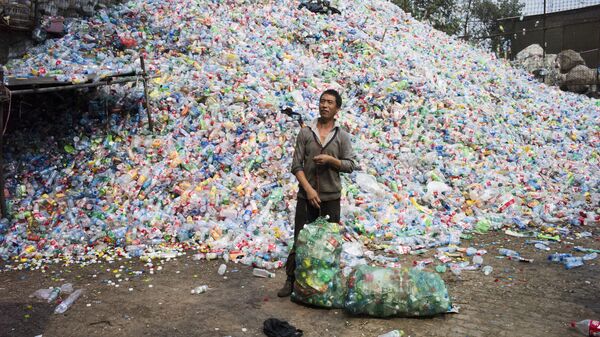Titled, Production, use, and fate of all plastics ever made, and published in Science Advances, the research found that although plastic has been in widespread mass production since the 1950s, the product has had rapid growth and is being manufactured at an "extraordinary" rate.
The report states that plastic production has surpassed that of other man-made materials, with the exception of steel, cement and brick.
Over 9.1 billion tons of plastic have been made and most of it thrown away https://t.co/cmYqmkpbD2 pic.twitter.com/2FTJ27Xp9B
— Science Advances (@ScienceAdvances) 19 July 2017
Of all the plastics ever produced and discarded, the study states nearly 80 percent has ended up in landfill or as waste in the environment.
Just 9 percent have been recycled, and 12 percent incinerated.
New @ScienceAdvances study: we made 8 billion tons of plastic in 65 years (50% in last 13) — 9% recycled, 79% dumped https://t.co/UCTX3XfM5E pic.twitter.com/RgmNVK8DoS
— Erik Solheim (@ErikSolheim) 20 July 2017
The study predicts that, if current trends continue, there would be 12 billion tons of plastic waste by 2050, equivalent to one and half times all the plastic produced throughout history to date.
According to the study, historically plastic has been recycled less, however recycling has increased in Europe and China. In 2014, 30 percent of plastic waste was recycled in Europe, and 25 percent recycled in China.
However, the US continues to lag behind Europe and China, recycling just 9 percent of its plastic waste in the same year.
SEA Prof. @klavlaw co-authors paper on "Production, use, and fate of all plastics ever made" in @ScienceAdvances https://t.co/QFDqzB526y pic.twitter.com/Sv3JJB9KF6
— SEA Semester (@SEA_Semester) 19 July 2017
Plastic is mainly used for packaging, however it can also be used in construction, where it can last for decades.
"If you spread all of this plastic equally, ankle-deep, it would cover an area the size of Argentina," said Roland Geyer, a professor of industrial ecology and the study's lead author.
The study did bring about concerns, with Professor Geyer saying that it's an "enormous amount of material that does not biodegrade."
"I am very worried," he added.
"Without a well-designed and tailor-made management strategy for end-of-life plastics, humans are conducting a singular uncontrolled experiment on a global scale, in which billions of metric tons of material will accumulate across all major terrestrial and aquatic ecosystems on the planet," Professor Geyer concluded.



